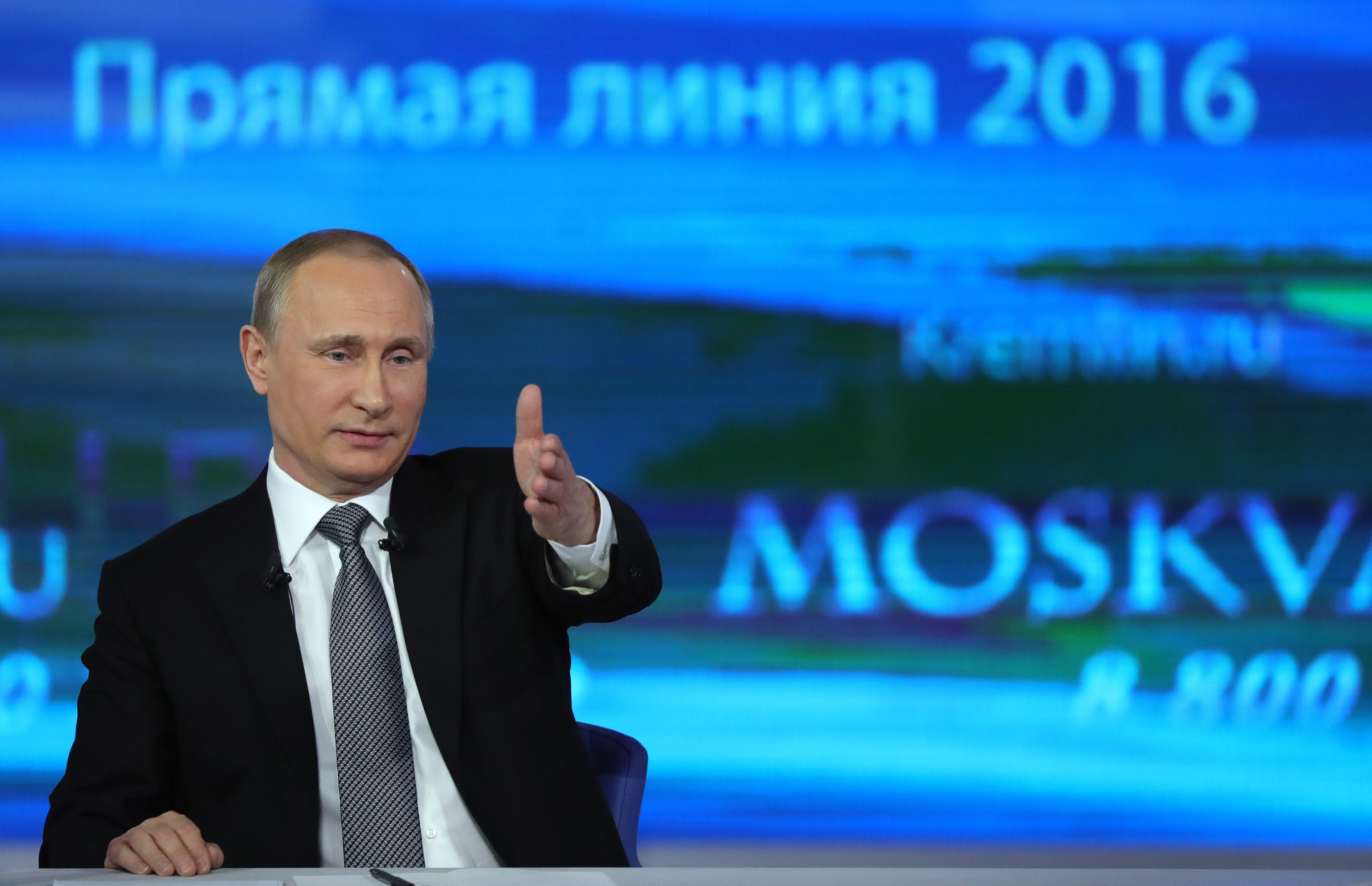![3 Things we learned about Putin from marathon [video : 83031366]](http://videos.usatoday.net/Brightcove2/29906170001/2016/04/29906170001_4845958258001_4845953540001-vs.jpg?pubId=29906170001)
![Russian President Putin [image : 83022126]](http://www.gannett-cdn.com/media/2016/04/14/USATODAY/USATODAY/635962199135593053-EPA-RUSSIA-PUTIN-LIVE-BROADCAST-NATIONWIDE-Q-A-SESSION.jpg)
MOSCOW — Sporting a natty tie, crisp white shirt and perched behind a desk like a friendly but serious news anchor, Russian President Vladimir Putin fielded questions for almost four hours Thursday in his annual marathon call-in show, discussing topics as far afield as illegal sports drugs, Ukraine, potholes, and Washington's "imperial ambitions."
Putin, looking relaxed and engaged, frequently made notes and waved a pen in his right hand for emphasis. Speaking before a live audience, the Russian leader sat in front of a blue screen swimming with the Kremlin email address, website and text number.
![Lighter moments from Putin's marathon call-in show [oembed : 83041750] [oembed : 83041750]](/Portals/_default/Skins/PrestoLegacy/CommonCss/images/smartembed.png)
At one point, the moderator for the highly scripted reality show said they had received more than 3 million calls.
The Russian president uses the annual call-in show to project an image as a strong leader who protects the nation from foreign threats and cares about people’s needs. In some cases, the complaints seemed to get immediate action.
![Russia Putin [image : 83023584]](http://www.gannett-cdn.com/-mm-/9214ec07c670aad0babd395b7ba230ed60d6bd4e/c=493-0-3025-2164/local/-/media/2016/04/14/USATODAY/USATODAY/635962239145269991-EPA-RUSSIA-PUTIN-LIVE-BROADCAST-NATIONWIDE-Q-A-SESSION-001.jpg)
Just minutes after a resident of Sakhalin named Tatyana asked about wage arrears at the fishing cannery where she worked, regional prosecutors reported they were investigating the company owner, according to Life News.
And minutes after a woman complained to Putin of bad roads in her home city of Omsk via video chat, showing the president a dirty, uneven street in the center of town, local officials vowed to rebuild the road by May 1.
As is often the case with his shows, Putin also used the occasion to give a rare peek into his personal life.
![Russia shrugs off criticism after buzzing U.S. ship [oembed : 83025526] [oembed : 83025526] [oembed : 83025526] [oembed : 83025526] [oembed : 83025526] [oembed : 83025526] [oembed : 83025526] [oembed : 83025526]](/Portals/_default/Skins/PrestoLegacy/CommonCss/images/smartembed.png)
Asked if he ever swore off camera, the Russian president said, "Only at myself," He then added, reluctantly, "Do I ever swear at subordinates? Yes, but again it’s because I’m angry at myself."
![Vladimir Putin Russia [image : 83023662]](http://www.gannett-cdn.com/media/2016/04/14/USATODAY/USATODAY/635962241006217849-AFP-550954094.jpg)
He deflected a question about whether he was planning to remarry. “(Let’s hope the question you raised) doesn’t influence the currency exchange rate or oil prices,” he joked. “Seriously, people elect … the president to work.” Putin said he sees relations with his ex-wife, Lyudmila Putina, as even better since they got divorced in 2014 and they see each other sometimes.
A number of questions came from children.
Varya Kuznetsova, 12, asked who Putin would save first if they were drowning: Ukrainian President Petro Poroshenko or Turkish President Recep Erdogan, two leaders with whom the Russian leader has a strained relationship.
“Varya, you’re putting me in a difficult situation. I don’t know what to say. If someone has decided to drown, it’s probably already impossible to save them anyway. Though of course we are ready to reach out a helping hand to any of our partners, if they want it.”
On foreign policy, Putin appeared to send mixed messages on relations with Washington, saying the United States must abandon its "imperial ambitions" and treat Russia as an equal partner.
While noting that the two countries have been able to cooperate constructively on non-proliferation issues, terrorism, and the Iranian nuclear deal, he warned the U.S. against “speaking from the position of force, diktat and imperial ambitions.” If the U.S. treats Russia with respect, he added, “we will always be able to find solutions that will satisfy everyone.”
Later, however, in response to a question about whether a woman might run for the Russian presidency as in the U.S., Putin used the opportunity to present a somewhat softer line.
"America is not the problem we face, we need to deal with domestic problems first, roads, education, economic development," he said. "If we do that, America will not be the issue. Because we will feel strong enough and we will be proud of our country."
Asked about Russia’s strained ties with Turkey, Ukraine and some other nations, Putin said Russia was ready for friendly ties with all nations but would retaliate against any hostile moves. “We must respond, or otherwise they will sit on our neck and whip us up,” Putin said.
On other issues, Putin:
• Said meldonium, the banned substance for which Russian tennis star Maria Sharapova tested positive, shouldn’t be considered a performance-enhancing drug. He said meldonium “doesn’t influence the result, that’s totally certain,” and instead “just keeps heart muscles in good condition.”
• Said Russia has shored up the Syrian army to the point where it can conduct offensive operations despite a Russian military drawdown. He also expressed hope that a Russian- and U.S.-brokered truce will help Syria peace talks in Geneva go forward, paving way for a new constitution and an early election.
• Noted that Russia’s agricultural production has risen even though its national economy has plunged into recession, and predicts that the economy will start growing next year.


